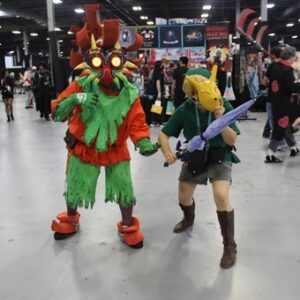This is Faith in Play #90: Nerd Enough, for May 2025.
Thanks to Bryan Ray for recommending the Min/Max Podcast. This topic comes from their second episode, some years back, which I just heard.

The issue raised was whether any of the panelists on the podcast thought that they were “nerd enough”, that is, were they to attend any of the many conventions that catered to nerd interests, would they be accepted as “one of us” by the geek/nerd community. They raised some interesting aspects to that; I’m going to illustrate by talking about myself.
The discussion addressed the question of whether geek and nerd mean different things, but what they discovered was that different people draw the lines differently, sometimes oppositely, and so for our purposes the two are essentially the same thing: someone whose interests lean toward certain oddball subjects including science fiction, fantasy, comic books, board games, role playing games, anime, tactical warfare games, computer and console games, and the like. One of the problems with this as a definition is that the concept of geekdom is that it is outside the mainstream, and many of these things, or aspects of them, have worked their way into the mainstream more recently. As Alec Hardison said (in Leverage), it’s the age of the geek: the people and things that were once outcast are now largely embraced–or perhaps the outcasts have come to outnumber the in crowd, and flipped the world around.
I have probably always been a nerd; at least my peers thought so–but perhaps for good reason. Science fiction and fantasy have been my favored genres for well over half a century–my favorite preschool cartoon was something called Space Angel, my favorite author in high school was Ray Bradbury, and in college I shifted to C. S. Lewis, J. R. R. Tolkien, and Charles Williams. My favorite stage play is probably Camelot, and my favorite movies include Ladyhawke and The Last Starfighter. I was watching the original Star Trek series in first-run episodes, and saw Star Trek: The Motion Picture in a drive-in. I began watching Dr. Who with Tom Baker, backtracked to catch what was then available of William Hartnell and Jon Pertwee (Patrick Troughton episodes were extremely difficult to find), and stayed a fan through Peter Davison, Colin Baker, and Sylvester McCoy. I started playing and running Dungeons & Dragons in 1980, expanded into several other role playing games, played some bookcase games before that, and in 1997 published the role playing game Multiverser: The Game, which I co-wrote. I have since written and published articles and books on such subjects as role playing game theory and design and time travel movies. For the past quarter century I have been a member of the board of directors of a respected international online organization of role playing and other gamers (this one, the Christian Gamers Guild), and I have been a guest several times at Ubercon, several other gaming conventions, and AnimeNEXT.
That last item in some ways highlights the difficulty of the question. It would be difficult to argue that I don’t have the credentials to qualify as a geek–but my familiarity with Anime is minimal, and I am a featured guest at this anime convention mainly because the people who run the games department know me and my game and want me there running Multiverser. To that, I find there are far more well-known science fiction authors I’ve never read than there are that I have, and I can’t remember the author names or book titles of many that I read and enjoyed. Despite my having analyzed nearly a hundred time travel movies, there are more that I haven’t seen than that I have, and the role playing game world has similarly exploded such that I’ve not heard of, let alone played, most of the games that are out there. Because I could perceive that budgetary issues would be a major concern, I stopped trying to keep up with console and computer games when Mattell stopped supporting Intellivision. And although my father was an electronics engineer working in the world of computers back when being online meant having a teletype that connected over a telephone to a mainframe somewhere else and which saved programs on a punched paper tape, my computer skills are minimal. There is far more about the world of the nerd that I don’t know than that I know, even in those areas in which I am most knowledgeable and respected for my knowledge.
And that is the nerdom problem: no one knows it all. No matter the degree to which we are qualified insiders, we are also always outsiders not only from the “normal” world but even within the havens of geeks. I often feel as if I am not adequately qualified for the position I’ve held for the last quarter century: the gaming world has left me behind. I don’t even know many of the people I once knew.
If you’ve ever felt that way–if you’ve felt as if you’re not “nerdy enough” to fit in with the people who attend conventions, you’re probably not–but then, neither is anyone else, and I would bet every one of us feels that way at least once in a while. It is the nature of nerd culture that it is expansive, inclusive, drawing in the outcasts whose interests are outside societal norms. That includes you. That means you are included; if you’re reading this, you are probably nerdy enough.
Also, if you’ve come here as a Christian, one of the callings of our faith is to love and embrace the outcasts. Love the nerds, whether or not you think you are one.
I don’t get to many conventions anymore–the ones where I was invited have mostly shut down. But if I get to another, I’ll look for you. You are certainly welcome at my table.
